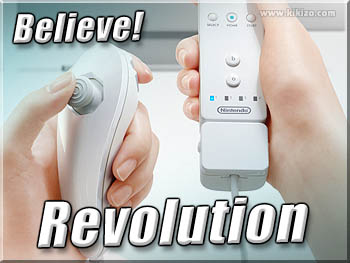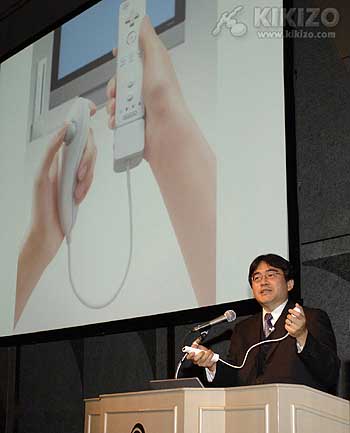Nintendo Shows Off the Revolution
Months of speculation brought to an end with a spectacular unveiling in Japan.
Nintendo has long warned that it will rattle the cage of empty technological advancement with its next-generation Revolution and that's precisely what the company appears set to do. At a press conference in Tokyo today, Nintendo president Satoru Iwata brought the teasing to an end and unveiled the Revolution's radical new controller.

The main part of the fragmented controller resembles a standard remote control - an apt metaphor as the similarities stretch beyond that. This part connects to a Bluetooth sensor you place at your TV and lets you control onscreen action simply by waving the wand around.
Up to four controllers can be used at any one time, opening up the floor for all-night parties of frantic slicing, chopping, hammering or any other activity developers choose to bring to their games.
But there's much more to the controller than that.
Using an expansion port located at the bottom of the controller, you'll be able to attach various components. The primary add-on - the only one what will be included in the final release package - is an analogue stick, with the resulting "nunchuk" configuration bearing a slight resemblance to the controllers already out there.
The combination is a good approximation of a keyboard and mouse and, as such, first-person shooters are getting an uncharacteristically big push from Nintendo. There's more than a hint of PR manoeuvring to this too, as FPS games are generally considered a staple of hardcore gamers (especially in the West), which is a demographic that Nintendo dearly wants to hang on to.
Ideologically, the Revolution's controller is an extension of what Nintendo has pushed with the DS. By dramatically straying from what's come before, everyone who picks it up is forced to start from the same position.
And this is really the key aspect of the design of the Revolution. As games progress, there is increasingly a trend of making prettier versions of existing games and hardware that's simply more powerful than its predecessor.
According to Iwata, this sort of thinking puts the industry as a whole in a precarious position where current games are becoming disillusioned and new gamers find everything a bit too complicated:
"When our games can no longer surprise, people will stop playing," Iwata said.
Revolution, like the DS before it, will level the field and make it easier for non-gamers to get started playing games and for ex-gamers to revisit their pastime.
One of the big features of the Revolution is its ability to play all Nintendo's past games, whether downloaded or in their original form. To control this wide range of games, you'll be able to buy other extensions that add the buttons and sticks they require.
There are, however, giant unknowns that remain, the most obvious of which concerns the types of games that will be appearing. Nintendo has not yet revealed any footage of Revolution games being played, which is perhaps worrying when you consider that the console is slated for release in 2006.
Nintendo has stressed that the innovation seen in the controller design does not mean that you can only expect gimmicky experiences. Rather, Iwata made clear that Nintendo is committed to providing the deep experiences his company built its name on.
Iwata's confidence in Revolution comes from the excellent performance of Nintendo's push to bring non-gamers to the DS - at least in Japan.
Games such as Nintendogs, Electroplankton and the Brain Training titles have been successful with a wide range of people, including older gamers and women - two audiences generally ignored by most game creators.
While Nintendo would likely be able to pull off the Revolution without any support from outside game creators, the new controller design seems to appeal to those outside of the company too.
During the press conference, Nintendo name-dropped some of the most successful designers making games today, including Hideo Kojima (Metal Gear Solid series) and Yuji Horii (Dragon Quest series).
As yet, there's a necessary Japanese sheen over the Revolution, but as the idea seeps into the Western consciousness, Nintendo will unveil what it has in store for those outside of its home country.
Discuss the Revolution controller here.
Alex Wollenschlaeger
Editor, Kikizo Games
| Video Coverage (Latest Videos & Video FAQ) | |||
| PLEASE DO NOT DIRECT LINK TO ANY MEDIA FILE ON KIKIZO | |||
| Description | Dur. | Size | Details |
|
Nintendo Revolution Video feature with Satoru Iwata on the particulars of the fascinating new Nintendo controller |
5.21m | 42MB | SD, 30 640x480 1Mbps |
|
Nintendo Revolution Revolution controller announcement video showing the how the controller is used in various game scenarios |
2.19m | 16MB | SD, 30 640x480 1Mbps |










 Satoru Iwata Video Interview - the late Nintendo president spoke with Kikizo in 2004 as 'Nintendo Revolution' loomed.
Satoru Iwata Video Interview - the late Nintendo president spoke with Kikizo in 2004 as 'Nintendo Revolution' loomed. Kaz Hirai Video Interview - the first of Kikizo's interviews with the man who went on to become global head of Sony.
Kaz Hirai Video Interview - the first of Kikizo's interviews with the man who went on to become global head of Sony. Ed Fries Video Interview - one of Xbox's founders discusses an epic journey from Excel to Xbox.
Ed Fries Video Interview - one of Xbox's founders discusses an epic journey from Excel to Xbox. Yu Suzuki, the Kikizo Interview - we spend time with one of gaming's most revered creators.
Yu Suzuki, the Kikizo Interview - we spend time with one of gaming's most revered creators. Tetris - The Making of an Icon: Alexey Pajitnov and Henk Rogers reveal the fascinating story behind Tetris
Tetris - The Making of an Icon: Alexey Pajitnov and Henk Rogers reveal the fascinating story behind Tetris Rare founders, Chris and Tim Stamper - their only interview? Genuinely 'rare' sit down with founders of the legendary studio.
Rare founders, Chris and Tim Stamper - their only interview? Genuinely 'rare' sit down with founders of the legendary studio. The History of First-Person Shooters - a retrospective, from Maze War to Modern Warfare
The History of First-Person Shooters - a retrospective, from Maze War to Modern Warfare